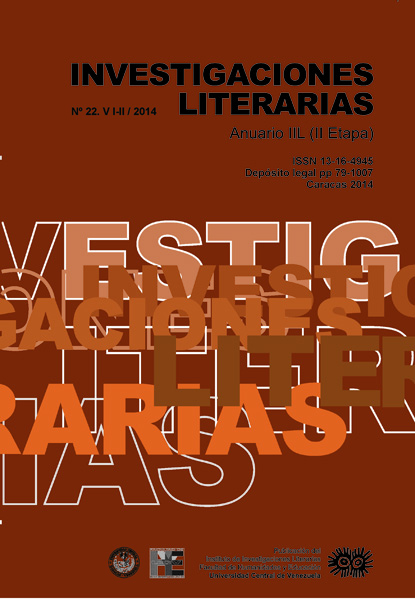PROBLEMAS DE LA POESÍA MUSICAL VENEZOLANA DE RAÍZ TRADICIONAL
Palabras clave:
Literatura oral, tradición, poesía oral contemporánea, autoría, oral literature, tradition, contemporary oral poetry, autorshipResumen
En esta comunicación quisiéramos sistematizar algunos problemas que presenta en «la contemporaneidad» una poesía cuyas marcas estéticas inmediata y directamente reconocibles son, por una parte, la conciliación de dos textos: el verbal y el musical y, por la otra, su condición de «folklórica», término que preferimos sustituir por tradicional. Dada su obvia oralidad, el primer problema concierne a su inserción en la Institución Literaria y a su consecuente aceptación en La Academia de las Letras, ambas condicionadas por la hegemonía de la escritura, pese a que el interés filológico por la Literatura Oral en Occidente se remonta a finales del siglo XVIII. El segundo dilema que nos parece prioritario dilucidar es cómo puede considerarse contemporánea una poesía cuyos orígenes se pierden en los procesos históricos de Conquista y Colonización desde los cuales se presumen los antecedentes formales y semánticos de «la herencia de un cantautor», según el verso de Teo Galíndez (s./f), uno de sus más conscientes albaceas poético-musicales. Ligadas a este, se nos presentan dos interrogantes más: una, hasta qué punto los cambios socio-culturales, la empresa del espectáculo, la industria discográfica y la mediatización tecnológico-informática afectan la evolución de su estereotipada tradicionalidad; otra, la función representativa que cumplen en el contexto de difusión los re-creadores individuales de un género conservado y transmitido de generación en generación por la memoria colectiva. Más que autores, son auctorictas (garantes legitimadores) de su heredada competencia ante el poder hegemónico y exclusivo de la firma escritural. Finalmente, la poesía musical venezolana de raíz tradicional presenta el afortunado problema de una vasta diversidad de subgéneros, cuya poética y nomenclatura dependen tanto del evento socio-religioso donde se interpreta como del ritmo musical que la vehicula.
ABSTRACT
In this paper we systematize some contemporary problems of a poetry which directly and immediately recognizable aesthetic marks are, on the one hand, the reconciliation of two texts: the verbal one and the musical one and, on the other hand, its «folk» condition, a term that we prefer to replace by traditional. Given its obvious orality, the first problem have to do with its insertion in the literary institution and its consequent acceptance at the Academy of Letters, both conditioned by the hegemony of writing, although the philological interest in oral literature in the West goes back in the late eighteenth century. The second dilemma is how can a poetry whose origins are lost in the historical processes of conquest and colonization be considered contemporary. It is presumed that in those processes lie the formal and semantic history of «the legacy of a singer», according to the verse Teo Galindez (s/f), one of its most conscious poetic-musical performers. Besides, we have two more questions: to what extent socio- cultural changes, the show business, the music industry and mediatization as consequence of information technologies’ development affect the evolution of the stereotypical traditionalism of this poetry; and what representative role do its re-creators play in the context of dissemination, considering that this poetry is preserved and passed down from generation to generation through collective memory. Rather than authors, they are auctorictas (legitimizing guarantors) of its inherited competency before the dominant and exclusive power of signature. Finally, the Venezuelan musical poetry of traditional roots involves the fortunate problem of a vast variety of subgenres, whose poetic and nomenclature depend on both the socio- religious event where it is performed as the musical rhythm that conveys it.

